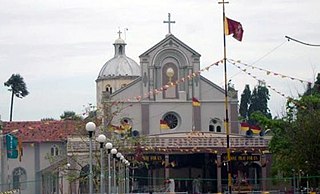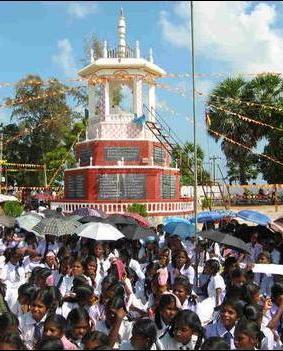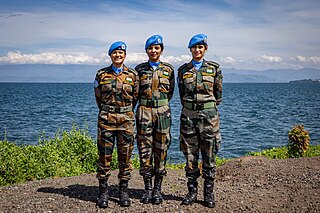Related Research Articles

The Sri Lankan Civil War was a civil war fought in Sri Lanka from 1983 to 2009. Beginning on 23 July 1983, it was an intermittent insurgency against the government by the Liberation Tigers of Tamil Eelam led by Velupillai Prabhakaran. The LTTE fought to create an independent Tamil state called Tamil Eelam in the north-east of the island, due to the continuous discrimination and violent persecution against Sri Lankan Tamils by the Sinhalese-dominated Sri Lanka government.

Velupillai Prabhakaran was an Eelam Tamil revolutionary. Prabhakaran was a major figure of Tamil nationalism, and the founder and leader of the Liberation Tigers of Tamil Eelam (LTTE). The LTTE was a militant organization that sought to create an independent Tamil state in the north and east of Sri Lanka in reaction to the oppression of the country's Tamil population by the Sri Lankan government. Under his direction, the LTTE undertook a military campaign against the Sri Lankan government for more than 25 years.
The Indo-Sri Lanka Peace Accord was an accord signed in Colombo on 29 July 1987, between Indian Prime Minister Rajiv Gandhi and Sri Lankan President J. R. Jayewardene. The accord was expected to resolve the Sri Lankan Civil War by enabling the thirteenth Amendment to the Constitution of Sri Lanka and the Provincial Councils Act of 1987. Under the terms of the agreement, Colombo agreed to a devolution of power to the provinces, the Sri Lankan troops were to be withdrawn to their barracks in the north and the Tamil rebels were to surrender their arms.

The Kandyan Wars refers generally to the period of warfare between the British colonial forces and the Kingdom of Kandy, on the island of what is now Sri Lanka, between 1796 and 1818. More specifically it is used to describe the expeditionary campaigns of the British Army in the Kingdom of Kandy in 1803 and 1815.

Indian Peace Keeping Force (IPKF) was the Indian military contingent performing a peacekeeping operation in Sri Lanka between 1987 and 1990. It was formed under the mandate of the 1987 Indo-Sri Lankan Accord that aimed to end the Sri Lankan Civil War between Sri Lankan Tamil militant groups such as the Liberation Tigers of Tamil Eelam (LTTE) and the Sri Lankan military.
Great Rebellion of 1817–1818, also known as the 1818 Uva–Wellassa Rebellion , was the third Kandyan War in the Uva and Wellassa provinces of the former Kingdom of Kandy, which is today the Uva province of Sri Lanka. The rebellion started against the British colonial government under Governor Robert Brownrigg, three years after the Kandyan Convention ceded Kingdom of Kandy to the British Crown.

The Vankalai massacre was a massacre of a family of four minority Sri Lankan Tamils at the hands of the Sri Lankan military personnel from the village of Vankalai in Mannar District, Sri Lanka on June 8, 2006. The victims were tortured and the mother was gang raped before her murder.

On June 12, 1991, 152 minority Sri Lankan Tamil civilians were massacred by members of the Sri Lankan military in the village Kokkadichcholai near the eastern province town of Batticaloa. The Sri Lankan government instituted a presidential commission to investigate the massacre. The commission found the commanding officer negligent in controlling his troops and recommended that he be removed from office, and identified nineteen other members of the Sri Lankan military to be responsible for mass murder. In a military tribunal that followed in the presidential commission in the capital city of Colombo, all nineteen soldiers were acquitted.
Eelam War I is the name given to the initial phase of the armed conflict between the government of Sri Lanka and the LTTE.
Eelam War III is the name given to the third phase of armed conflict between the Sri Lankan military and the separatist Liberation Tigers of Tamil Eelam (LTTE).

Eelam War IV is the name given to the fourth phase of armed conflict between the Sri Lankan military and the separatist Liberation Tigers of Tamil Eelam (LTTE). Renewed hostilities began on the 26 July 2006, when Sri Lanka Air Force fighter jets bombed several LTTE camps around Mavil Aru anicut. The government's casus belli was that the LTTE had cut off the water supply to surrounding paddy fields in the area. Shutting down the sluice gates of the Mavil Aru on July 21 depriving the water to over 15,000 people - Sinhalese and Muslim settlers under Sri Lankan state-sponsored colonisation schemes in Trincomalee district. They were denied of water for drinking and also cultivating over 30,000 acres of paddy and other crops. The fighting resumed after a four-year ceasefire between the Government of Sri Lanka (GoSL) and LTTE. Continued fighting led to several territorial gains for the Sri Lankan Army, including the capture of Sampur, Vakarai and other parts of the east. The war took on an added dimension when the LTTE Air Tigers bombed Katunayake airbase on March 26, 2007, the first rebel air attack without external assistance in history.

The Kingdom of Kandy was a monarchy on the island of Sri Lanka, located in the central and eastern portion of the island. It was founded in the late 15th century and endured until the early 19th century.

The Eastern Theatre of Eelam War IV started in the Eastern province of Sri Lanka on July 21, 2006 when the LTTE cut off the water supply to rice fields in eastern Trincomalee district. The government claimed total control of the Eastern province after capturing Thoppigala on July 11, 2007, after nearly a year of fighting. Major battles took place at Sampoor, Vakarai, Kanchikudicharu, Kokkadichloai and Thoppigala. Military and civilian deaths were relatively low on both sides. Government forces captured much military hardware from the LTTE during the conflict. The civilians managed to flee the combat zones, and this reduced civilian casualties, while swelling the number of internally displaced people (IDP). The world health organization (WHO) estimated ~200,300 IDPs, and claims that significant progress occurred in resettling them. The LTTE vowed to attack Sri Lanka's military and economic targets across the country to retaliate for the capture of the Eastern province from them. This was stated by the leader of the LTTE's political wing, S.P. Thamilchelvan, in a statement to Associated Press on July 12, 2007.
The Northern Theatre of Eelam War IV refers to the fighting that took place in the northern province of Sri Lanka between July 2006 and May 18, 2009.
The 2008–2009 SLA Northern offensive was an armed conflict in the northern Province of Sri Lanka between the military of Sri Lanka and the separatist Liberation Tigers of Tamil Eelam (LTTE). The battle began with a Sri Lanka Army (SLA) offensive attempting to break through the LTTE defence lines in the north of the island, aiming to conclude the country's 25-year-old civil war by military victory.
War crimes during the final stages of the Sri Lankan Civil War are war crimes and crimes against humanity which the Sri Lanka Armed Forces and the Liberation Tigers of Tamil Eelam have been accused of committing during the final months of the Sri Lankan Civil War in 2009. The war crimes include attacks on civilians and civilian buildings by both sides; executions of combatants and prisoners by both sides; enforced disappearances by the Sri Lankan military and paramilitary groups backed by them; sexual violence by the Sri Lankan military; the systematic denial of food, medicine, and clean water by the government to civilians trapped in the war zone; child recruitment, hostage taking, use of military equipment in the proximity of civilians and use of forced labor by the Tamil Tigers.

General Anuruddha Leuke Ratwatte, frequently referred to as Anuruddha Ratwatte, was a Sri Lankan politician and army officer. He was a Cabinet Minister and Deputy Minister of Defence.

Sinhalese–Portuguese conflicts refers to the series of armed engagements that took place from 1518 AD to 1658 AD in Sri Lanka between the native Sinhalese and Tamil kingdoms and the Portuguese Empire. It spanned from the Transitional to the Kandyan periods of Sri Lankan history. A combination of political and military moves gained the Portuguese control over most of the island, but their invasion of the final independent kingdom was a disaster, leading to a stalemate in the wider war and a truce from 1621. In 1638 the war restarted when the Dutch East India Company intervened in the conflict, initially as an ally of the Sinhalese against the Portuguese, but later as an enemy of both sides. The war concluded in 1658, with the Dutch in control of about half the island, the Kingdom of Kandy the other half, and the Portuguese expelled.

Women have regularly participated in global peacekeeping efforts, including through the United Nations. Although participation greatly increased in the last decade of the 20th century and the first two decades of 21st century, women remained significantly underrepresented in peacekeeping operations in 2023. The participation of women in peacekeeping operations differs significantly between military contingents, military observers, staff officers versus police units. Gender stereotypes and discrimination often limit women's opportunities for advancement and leadership roles within international organizations and military institutions. Additionally, women often face discrimination and harassment in male-dominated peacekeeping environments.
References
- ↑ "How Visaka Dharmadasa's Tragedy Led to a Rise in Sri Lankan Peace Activism". ICAN. Retrieved 2020-06-20.
- 1 2 3 4 5 6 "Biography for Visaka Dharmadasa" (PDF).
- ↑ "Visaka Dharmadasa – Peace Post". peace-post.com. Retrieved 2020-06-19.
- ↑ "Visaka Dharmadasa | Conciliation Resources". www.c-r.org. Retrieved 2020-06-19.
- 1 2 "Visaka Dharmadasa". gppac.net. Retrieved 2020-06-19.
- ↑ "VISAKA DHARMADASA (Sri Lanka) | WikiPeaceWomen – English". wikipeacewomen.org. Retrieved 2020-06-19.